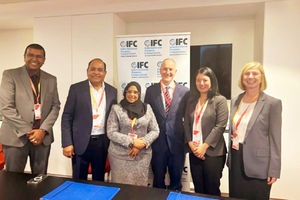Inside Tanzania’s Sh4.6 trillion clean cooking energy plan

President Samia Suluhu Hassan, Prime Minister Kassim Majaliwa, Deputy Prime Minister and Minister of Energy Doto Biteko, along with Minister of State in the Vice President’s Office, [Union Affairs and Environment], Selemani Jafo, applaud during the launch of the National Strategy for Clean Cooking Energy in Dar es Salaam on May 8. PHOTO | STATE HOUSE
What you need to know:
- With the launch of the ten-year National Strategy for Clean Cooking Energy (NSCCE, 2024-2034), President Samua Suluhu Hassan also directed officials from the Energy and Finance ministries to sit down with members of the private sector and other stakeholders and deliberate on where and how to source funds that will be spent on subsidising cooking gas and the cylinders
Dar es Salaam. The government is poised to implement a raft of measures, one of them being the imminent declaration of a comprehensive prohibition on the utilisation of non-renewable cooking fuels by institutions catering to gatherings of over 100 individuals, effective immediately.
The government will also work with members of the private sector to come up with ways of lowering the cost of cooking gas cylinders and simplifying the refilling process for rural dwellers, President Samia Suluhu Hassan said on Wednesday, May 8.
With the launch of the ten-year National Strategy for Clean Cooking Energy (NSCCE, 2024-2034), President Hassan also directed officials from the Energy and Finance ministries to sit down with members of the private sector and other stakeholders to deliberate on where and how to source funds that will be spent on subsidising cooking gas and the cylinders.
“We need a special fund for clean cooking energy... This is what we will talk about in a meeting in Paris [France] tomorrow,” said President Hassan as she graced the launch of the strategy, whose implementation will cost a staggering Sh4.6 trillion (about $1.8 billion) in the coming ten years.
The Sh4.6 trillion strategy envisions raising the population of Tanzanian households that use clean cooking energy from the current ten percent to 80 percent by the year 2034.
The Ministry of State in the President’s Office (Regional Administration and Local Government Authorities) [PO-RALG], President Hassan said, should come up with a modality through which the use of clean energy will be one of the Key Performance Indicators (KPIs) for officials at the district and grassroots levels.
In three months from now, President Hassan said, government officials will have to deliver a comprehensive progress report on the implementation of the various directives on the subject matter, including one that compels institutions that feed over 100 people at any given time to shift from firewood and charcoal to clan energy.
“The use of clean cooking energy is no longer a luxurious thing. It is a necessity,” said President Hassan.
Despite being largely considered to be cheaper options, charcoal, firewood and crop residues were having profoundly detrimental impacts on people’s health, causing up to 33,000 deaths annually, according to data from the Energy Ministry.
Data produced in 2022 by the Energy Ministry shows that a person who is exposed to firewood smoke for an hour has similar health risks as a person who smokes between 200 and 300 cigarettes.
The preparation of the strategy was in line with the directives the President made during the 2022 Clean Energy Conference.
Speaking at the same event, the minister of State in the Vice President’s Office (Union and Environment), Mr Selemani Jafo, said it was now being estimated that Tanzania was losing about 469,000 hectares of its forests each year due to the cutting down of trees for charcoal and firewood.
The Prime Minister, Mr Kassim Majaliwa, also said all key players were involved in the preparation of the strategy in a joint effort to reduce the use of firewood, charcoal and crop residues as cooking energy.
He said the NSCCE strategy, which will need a total of Sh4.6 trillion to implement, involves the inputs of all key players in the cooking energy sector.
He said since 2022, several steps have been taken, including restricting some public institutions, such as prisons and schools, from using dirty energy.
In her remarks, the Speaker of Parliament, Dr Tulia Ackson, commended President Hassan for the steps her administration was taking to use clean cooking energy, which, she said, translate into better health for women and girls.
“When we talk of health and its connection with dirty cooking energy, we are talking of the entire burden that a woman shoulders in her daily responsibilities, promising that the Parliament would work hand in hand with the government in all matters that seek to elevate the economic conditions of Tanzanians.




